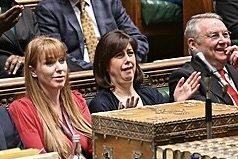Labour minister Lucy Powell has come under fire this week following controversial comments she made during a live broadcast of BBC Radio 4’s Any Questions?. Referring to the issue of grooming gangs as a “dog whistle” and accusing another panelist of “blowing that little trumpet,” Powell’s remarks were swiftly condemned by survivors, campaigners, and political rivals. After several days of mounting pressure, Powell issued a public apology in Parliament. The incident has reignited debate around political accountability, sensitive discourse, and the long-standing failures in addressing child sexual exploitation in the UK.
The Controversial Remarks That Sparked Outrage
During the panel discussion on Any Questions?, Powell was responding to political commentator Tim Montgomerie, who had referenced a Channel 4 documentary about survivors of grooming gangs. Montgomerie highlighted the need for political parties to address the issue more seriously. Powell interjected with: “Oh, we want to blow that little trumpet now, do we? Let’s get that dog whistle out, shall we?”
These words were perceived by many as dismissive of the survivors’ experiences and of the national scandal surrounding grooming gangs in areas like Rotherham, Rochdale, and Telford. Critics argued that Powell was suggesting the topic was being used as a political tool rather than acknowledging the very real trauma involved.
The Program Setting
The discussion was meant to cover law, justice, and political accountability. The Channel 4 documentary that Montgomerie referenced had triggered fresh calls for a national inquiry into how grooming gangs have been handled by local authorities and law enforcement.
Immediate Fallout
Social media erupted almost immediately, with many users accusing Powell of minimizing the pain of victims. Survivors’ groups issued statements condemning the remarks, and political figures across the spectrum weighed in, some calling for her resignation.
Political and Public Reactions
The backlash extended well beyond social media. Child protection charities and victim advocates said Powell’s comments felt like a step backward in their fight for recognition and justice.
Responses from Survivors
Many survivors and their families said they felt “re-traumatized” by the dismissive language, calling it a betrayal from someone in public office.
Condemnation from Conservatives
Conservative MPs seized on the comments as proof that Labour still wasn’t taking the grooming scandal seriously enough. Shadow Home Secretary Chris Philp accused Powell of using the same rhetoric that once allowed authorities to ignore these crimes.
Support and Defenses
Health Secretary Wes Streeting defended Powell, saying she was “mortified” and that her words were poorly chosen in a heated moment. He urged people to look at Powell’s record rather than a single statement taken out of context.
Powell’s Apology in Parliament
Facing intense scrutiny, Lucy Powell addressed the controversy directly in the House of Commons. She said:
“I am very sorry for those remarks, as I made clear over the weekend. I and every member of this Government want your truth to be heard—wherever that truth leads.”
She emphasized that her intent was to criticize political point-scoring—not the victims or the issue itself. Powell reiterated Labour’s commitment to implementing recommendations from recent inquiries and improving safeguarding standards.
Prime Minister’s Response
Prime Minister Keir Starmer stood by Powell, noting that she had taken responsibility and apologized. However, he reaffirmed Labour’s commitment to addressing grooming gangs and said the party would continue listening to victims’ voices.
Broader Implications for Labour Party
This controversy has damaged Labour’s credibility on an issue where the party already faces criticism for past failures. Some local councils, run by Labour, have been implicated in grooming gang scandals where victims were ignored or dismissed. Powell’s comments reopened wounds and reminded many of those institutional failures.
Past Controversies and Handling of Abuse Cases
The scandals in Rotherham, Rochdale, and elsewhere have led to multiple inquiries and damning reports about systemic neglect. Critics argue that the language used by Powell, even if unintentional, echoes that same culture of downplaying the issue.
The Importance of Language in Politics
In modern politics, language is everything—especially on sensitive issues like child sexual exploitation. Powell’s remarks, however unintended, struck a nerve because they reminded the public of how victims have often been dismissed, ignored, or silenced.
Media Framing and Public Perception
Media coverage of the incident amplified the backlash, with headlines focusing on the “dog whistle” comment. While Powell’s defenders say her words were misconstrued, the damage to public perception is evident.
What’s Next? Policy and Political Outlook
Labour is expected to double down on its messaging around child safety and exploitation. There are renewed calls for a national inquiry into grooming gangs, alongside proposals to toughen sentencing and improve victim support.
Calls for Inquiries and Legal Reform
Campaigners are urging the government to go further—demanding a full-scale inquiry into institutional failures, more survivor-led policymaking, and better police training on grooming patterns.
Conclusion
Lucy Powell’s controversial comments and subsequent apology have stirred up deep emotions around one of the most painful and politically charged issues in the UK. While she has apologized, the event is a stark reminder of how politicians must approach topics of abuse with care, respect, and responsibility. For victims and survivors, words matter—and so do actions. What happens next will determine whether this moment leads to progress or remains another political flashpoint.
FAQs
- What did Lucy Powell say about grooming gangs?
She referred to raising the issue as “blowing that little trumpet” and called it a “dog whistle” during a BBC panel debate. - Why were her comments so controversial?
Many saw them as dismissive of a serious and traumatic issue affecting grooming gang survivors. - Has she apologized?
Yes, Powell issued a public apology in Parliament, stating she was sorry and did not intend to minimize the issue. - What is the government doing about grooming gangs?
The government has promised to implement recommendations from recent inquiries and improve safeguarding across the UK. - Will Powell face consequences for her remarks?
As of now, there are no formal consequences. Powell remains in her role with support from the Prime Minister.



